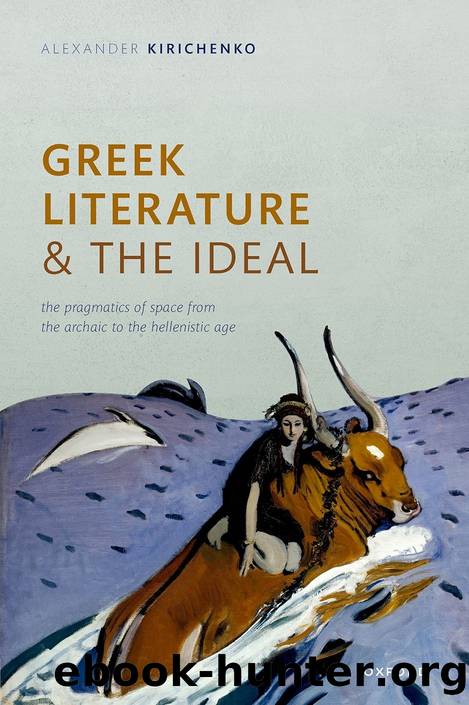Greek Literature and the Ideal by Alexander Kirichenko

Author:Alexander Kirichenko [Kirichenko, Alexander]
Language: eng
Format: epub
ISBN: 9780192692009
Publisher: OUP Oxford
Published: 2022-08-04T00:00:00+00:00
Greek Literature and the Ideal: The Pragmatics of Space from the Archaic to the Hellenistic Age. Alexander Kirichenko, Oxford University Press. © Alexander Kirichenko 2022. DOI: 10.1093/oso/9780192866707.003.0008
1 Ober 1998, 181â3; Weiss 1998, 84â133; Vasiliou 2008, 79â84.
2 Cf. Ober 2011, 151â2.
3 Note that in the Laws, too, the model (ÏαÏάδειγμα) of the absolutely law-abiding city could only be fully put into practice if it were to be inhabited by gods or by children of gods: Pl. Lg. 739dâe.
4 Weiss 1998, 169. Cf. Harte 2005.
5 Kahn 1983; Carone 2004.
6 Weiss 1998, 39â56.
7 Benardete 1991, 98â102; Fussi 2006, 75â128; Stauffer 2006, 167â76; Sedley 2009; Edmunds 2012; Rowe 2012.
8 Weiss 1998, 24â7. Given Socratesâ admiration for Crete, it is hardly surprising that Magnesia, the ideal state of the Laws, is to be located on Crete. On the connections between the ideal states of the Republic and the Laws, see Prauscello 2014, 21â101.
9 Cf. Weiss 1998, 13â15; Griswold 2011, 337.
10 On the historical background, see Slings 1994, 163â6. Cf. Ober 2011, 167â9.
11 While Xenophon (X. HG 1.7) only emphasizes the failure of the rescue operation in general (e.g. 1.7.4), Diodorus Siculus insists that the generalsâ crime consisted in leaving the dead unburied: Diod. 13.101, esp. 1.
12 On the confusing numbers (eight generals in Xenophon, only six of them put on trial, and ten generals in Plato, actually two generals and two trierarchs), see Slings 1994, 162.
13 On the Apaturia, see Deubner 1932, 232â4; Parke 1977, 88â92; Schmitt Pantel 1992, 81â90 and 131â5.
14 Vasiliou 2008, 51â6.
15 Ober 1998, 174â5.
16 Ober 2011, 153â8.
17 Weiss 1998, 8â15.
18 On this ideal in the funeral orations, see Loraux 1986, 145â71. Note, too, that Socrates draws an analogy between himself and Achilles (Pl. Ap. 28b3âd5: Euben 1990, 219â26; Vasiliou 2008, 24â7)âthe paradigm of heroic death par excellence, which thoroughly informs what, according to Loraux, is the essentially aristocratic ethos of the Athenian funeral oration: Loraux 1986, 76â94 and 219â78. Cf. Thomas 1989, 213â21.
19 Loraux 1986, 55â8; Grethlein 2010, 108â9.
20 Cf. Segal 1995, 122â3.
21 Note that both Antigone and Socrates are willing to die a âgood deathâ: S. Ant. 96â7 (cf. 460â70) and Pl. Ap. 40b7â8. The same motivation informs the scenes of voluntary self-sacrifice in Euripides, esp. E. Heracl. 525â6: Wilkins 1990.
22 Another striking similarity between Antigone and Socrates is that both claim that their strikingly outlandish ideas are in fact shared by all: S. Ant. 508â9 and Pl. Grg. 474b2â5. See also Euben 1990, 126â9, for illuminating remarks on the similarities between Platoâs Apology and Crito and Sophoclesâ Oedipus Tyrannus.
23 Belfiore 2012, 125â7.
24 Ludwig 2002, 59â60; Davidson 2007, 418â23.
25 Monoson 2000, 21â50.
26 Stauffer 2006, 60â2.
27 Cf. Ludwig 2002, 141â53; Wohl 2002, 144â58.
28 Leitao 2012, 146â81. Blepyrusâ main concern seems to be (Ar. Ec. 359â60) á¼Î»Î»á¾¿ á½ Ïαν ÏάγÏ, / á½ Ïοι βαδιεá¿Ïαί μοι Ïὸ λοιÏὸν ἡ κÏÏÏοÏ: Henderson 1975, 102â3. On Aristophanesâ scatological humor in general, see Henderson 1975, 187â203.
29 Cf. Bowie 1993, 201â4; McGlew 2002, 162â3.
30 Note that Aristophanes is ultimately âhealedâ by the speech of the physician Eryximachus, who identifies
Download
This site does not store any files on its server. We only index and link to content provided by other sites. Please contact the content providers to delete copyright contents if any and email us, we'll remove relevant links or contents immediately.
| Ancient & Classical | Greek |
| Medieval | Roman |
Letters From a Stoic by Seneca(2797)
The Valmiki Ramayana: Vol. 1 by Bibek Debroy(2410)
The Valmiki Ramayana: Vol. 2 by Bibek Debroy(2269)
The Valmiki Ramayana: Vol. 3 by Bibek Debroy(2216)
Mary Boleyn by Alison Weir(1883)
The Greeks by H. D. F. Kitto(1744)
The Notebooks of Leonardo Da Vinci by Da Vinci Leonardo(1604)
The Classics by Mary Beard(1590)
Mythos (2019 Re-Issue) by Stephen Fry(1567)
The Voynich Manuscript by Gerry Kennedy(1472)
Medea and Other Plays by Euripides(1442)
Art of Living by Sellars John;(1426)
Annals by Tacitus(1410)
Hindoo Holiday by J. R. Ackerley(1382)
Claudius the God by Robert Graves(1290)
Appeasement of Radhika by Muddupalani(1280)
Atlantis the Lost Continent Finally Found by Arysio Santos(1250)
THE REPUBLIC by plato(1248)
Kadambari: Bana by Bana(1228)
